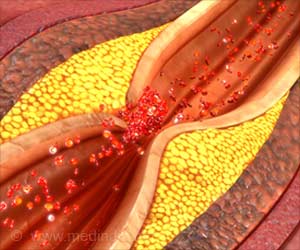Highlights:
- Loss of a single gene in modern humans during the process of evolution from our ancestors about 2-3 million years ago might explain why heart attacks are very common in humans but extremely rare in other animals
- The loss of the Cytidine Monophosphate-N-Acetylneuraminic acid Hydroxylase (CMAH) gene might accelerate the rate of atherosclerosis, thereby, increasing heart attack risk in humans
- In about 15% of heart attacks, no pre-existing risk factor for atherosclerosis such as smoking, high blood pressure or cholesterol, and increasing age is identified, suggesting there may be other factors involved
Read More..
Heart Attacks Extremely Rare in Other Mammals
- Heart attacks due to coronary artery atherosclerosis are virtually not reported in other mammals, including chimpanzees in captivity which are closely related and share human-like risk factors, such as high blood pressure, high cholesterol levels and physical inactivity.
- Other primates including chimps and great apes have the CMAH gene which is absent in humans
- Chimp "heart attacks" have been found to occur due to scarring of the heart muscle, the cause of which remains unclear
Effect of Loss of CMAH Gene and Rate of Atherosclerosis
- The study team conducted their research comparing test mice genetically modified to resemble humans (knocking off the CMAH gene) with control mice that retained the CMAH gene
- The group of genetically modified mice without the CMAH gene became deficient in Neu5Gc (a sugar molecule) which is encoded by the CMAH gene
- These mice demonstrated a significant increase in the rate of atherogenesis compared to mice that had intact CMAH gene and normal Neu5Gc activity
- Elimination of CMAH gene and Neu5Gc activity in genetically modified mice caused nearly double the severity of atherosclerosis in comparison to unmodified mice
- At the same time, when mice modified to lack the CMAH gene (similar to humans) were fed a diet high in Neu5Gc such as red meat and fats, they showed a further 2.4-fold increase in atherosclerosis, that could not be explained by changes in blood sugar and lipid levels
The authors feel that several other factors may also play a role in increasing heart attack risk in humans, and further investigation is needed.
Ajit Varki, MD, Distinguished Professor Of Medicine and Cellular And Molecular Medicine at University of California San Diego School of Medicine, and co-author of the study said: "The increased risk (of atherosclerosis) appears to be driven by multiple factors, including hyperactive white cells and a tendency to diabetes in the human-like mice. This may help explain why even vegetarian humans without any other obvious cardiovascular risk factors are still very prone to heart attacks and strokes, while other evolutionary relatives are not."
How Loss of CMAH Gene Causes Atherosclerosis
As stated earlier, due to loss of the CMAH gene, humans are naturally deficient in Neu5Gc sugar and are prone to accelerated atherosclerosis.Interestingly, red meat, dairy products and certain fish are rich in this Neu5Gc sugar.
When humans consume products rich in this sugar, there is an immune response to the sugar, which is recognized as foreign. This immune response produces a generalized state of inflammation in the body, which in turn increases risk of atherosclerosis and heart disease, arthritis and certain cancers.
Other Effects of Loss of CMAH Gene in Humans
Other significant alterations in the human body due to evolutionary loss of CMH gene, including increased exercise capacity and ability to run long distances and a reduced fertility rate.In summary, loss of CMAH gene and other factors may explain why humans are prone to heart attacks compared to other animals and why some persons with no known identifiable risk factors suffer heart attacks.
References:
- Human species-specific loss of CMP-N-acetylneuraminic acid hydroxylase enhances atherosclerosis via intrinsic and extrinsic mechanisms - (https://www.pnas.org/content/early/2019/07/18/1902902116)
- A Single Gene Mutation May Have Helped Humans Become Optimal Long-Distance Runners - (https://health.ucsd.edu/news/releases/Pages/2018-09-11-single-gene-mutation-may-have-helped-humans-become-optimal-long-distance-runners.aspx)
Source-Medindia















